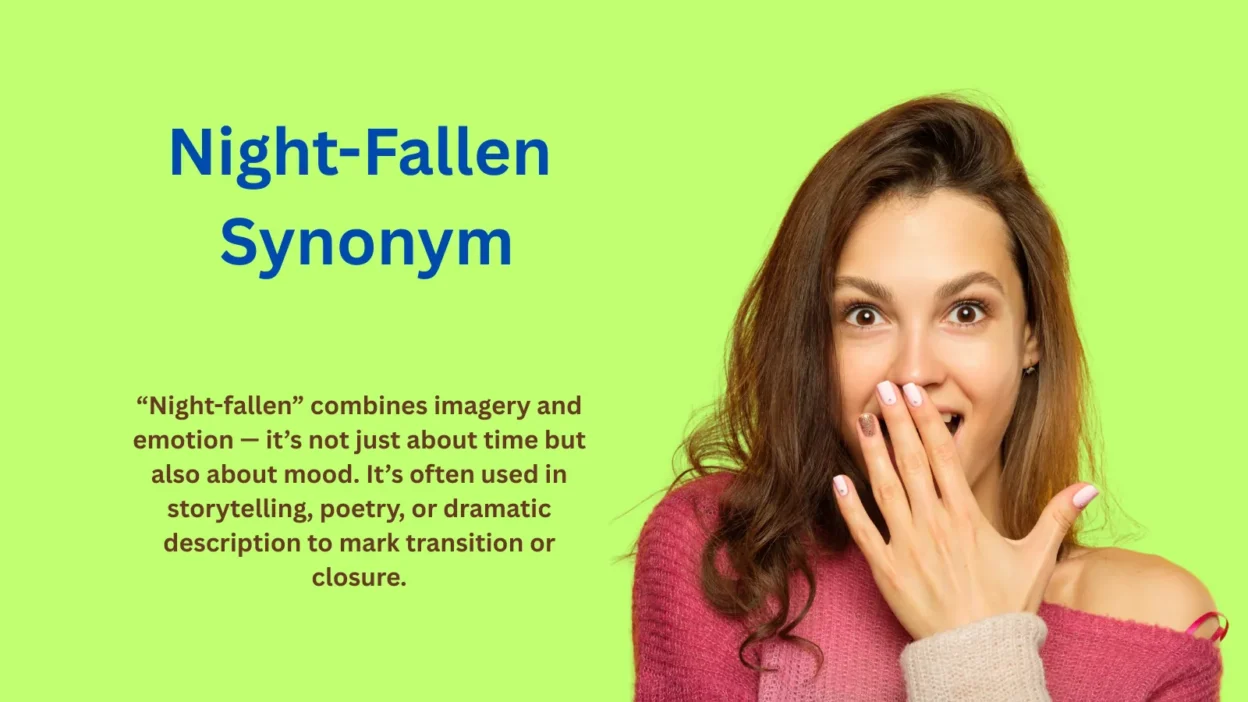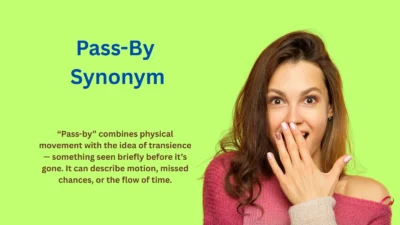Night-fallen synonym words like dusk, twilight, and nightfall describe the time when daylight fades and darkness begins to settle. For example, “They reached the cabin by dusk,” or “Silence filled the streets at nightfall.”
If you’re writing poetry, describing a scene, or setting a mood, each synonym offers a unique tone—from calm and dreamy to mysterious and haunting.
In this guide, you’ll learn the meanings and example sentences for each night-fallen synonym, so you can express evening transitions and nighttime moods with accuracy and elegance.
What Does “Night-Fallen” Mean?
The phrase “night-fallen” describes the moment when night has arrived or darkness has completely replaced daylight. It often evokes a poetic or atmospheric feeling — signaling the quiet, mystery, or calm of night.
Examples:
- “The village slept under the night-fallen sky.”
- “By the time they returned, the world was night-fallen and still.”
“Night-fallen” combines imagery and emotion — it’s not just about time but also about mood. It’s often used in storytelling, poetry, or dramatic description to mark transition or closure.
Synonyms of Night-Fallen with Meanings, Examples, and Usage Tips
1. Nightfall
Meaning: The time when night begins; the end of daylight.
Example: They lit the lamps at nightfall.
When to Use: Neutral and commonly used in both prose and speech.
2. Dusk
Meaning: The darker stage of twilight before night fully sets in.
Example: The city glowed softly at dusk.
When to Use: Perfect for gentle or romantic tone.
3. Twilight
Meaning: The faint light after sunset or before sunrise.
Example: Birds sang their last songs in the twilight.
When to Use: Poetic, nostalgic, or dreamy scenes.
4. Sundown
Meaning: The time when the sun goes below the horizon.
Example: They stopped hiking just before sundown.
When to Use: Casual, narrative, or descriptive writing.
5. Eventide
Meaning: An old-fashioned word for evening.
Example: The church bells rang softly at eventide.
When to Use: Formal, literary, or poetic tone.
6. Eve
Meaning: The period before night or a significant event.
Example: The festival began on Christmas Eve.
When to Use: Traditional or festive contexts.
7. Nighttime
Meaning: The period during the night; after dark.
Example: Owls awaken in the nighttime hush.
When to Use: Simple, neutral — everyday tone.
8. After Dark
Meaning: The time following sunset; night hours.
Example: The streets were quiet after dark.
When to Use: Informal, conversational.
9. Evening
Meaning: The period between late afternoon and night.
Example: They shared tea in the calm of evening.
When to Use: Neutral, flexible — suits both formal and casual.
10. Night’s Arrival
Meaning: The onset of nighttime.
Example: The forest turned silver at night’s arrival.
When to Use: Poetic or atmospheric descriptions.
11. Gloaming
Meaning: The soft light of dusk; twilight.
Example: She walked home through the quiet gloaming.
When to Use: Romantic or old-fashioned tone.
12. Dimlight
Meaning: Faint or low light as night begins.
Example: Fireflies glimmered in the dimlight.
When to Use: Poetic, descriptive imagery.
13. Blackness
Meaning: The state of total darkness.
Example: The blackness of night swallowed the horizon.
When to Use: Dramatic or mysterious writing.
14. Darkfall
Meaning: The time when darkness falls.
Example: The village vanished at darkfall.
When to Use: Poetic, fantasy, or creative prose.
15. Starfall
Meaning: The appearance of stars as night deepens.
Example: Lovers met under the quiet starfall.
When to Use: Romantic or dreamy scenes.
16. Shadows’ Hour
Meaning: Time when shadows lengthen and night takes over.
Example: It was the shadows’ hour when the forest stilled.
When to Use: Symbolic or gothic tone.
17. Moonrise
Meaning: The moment when the moon appears above the horizon.
Example: The waves shimmered beneath the moonrise.
When to Use: Poetic or cinematic settings.
18. Darkness
Meaning: Absence of light; the condition of the night.
Example: Darkness crept across the empty fields.
When to Use: Common, direct, and versatile.
19. The Fall of Night
Meaning: Transition from day to night.
Example: Travelers hurried home at the fall of night.
When to Use: Literary, descriptive tone.
20. Black of Night
Meaning: Deep or total night darkness.
Example: He vanished into the black of night.
When to Use: Dramatic or narrative storytelling.
21. Night’s Descent
Meaning: Gradual deepening of darkness.
Example: The village lamps flickered at night’s descent.
When to Use: Elegant, reflective writing.
22. Eveningtide
Meaning: Old poetic term for the time of evening.
Example: Eveningtide brought peace to the valley.
When to Use: Poetic or archaic style.
23. Nightshade Hour
Meaning: Time of mystery and silence at night.
Example: Whispers lingered in the nightshade hour.
When to Use: Gothic, fantasy, or moody tone.
24. Dimming
Meaning: The fading of light as night begins.
Example: The dimming horizon glowed one last time.
When to Use: Soft or melancholic tone.
25. Evenlight
Meaning: Gentle light of early night or dusk.
Example: Lanterns flickered through the evenlight.
When to Use: Inventive or poetic expression.
26. Murk
Meaning: Thick darkness or shadow.
Example: The forest lay hidden in the murk.
When to Use: Suspenseful or eerie descriptions.
27. Black Veil
Meaning: Metaphor for night covering the land.
Example: The black veil of night descended quietly.
When to Use: Poetic, dramatic tone.
28. Midnight’s Edge
Meaning: The time approaching deep night.
Example: Dreams began at midnight’s edge.
When to Use: Poetic, fantasy, or narrative tone.
29. Dusktime
Meaning: The period right as day ends.
Example: The fields turned golden at dusktime.
When to Use: Gentle, natural descriptions.
30. Hushed Hour
Meaning: The quiet, peaceful moment of night’s arrival.
Example: Crickets sang softly in the hushed hour.
When to Use: Soothing, reflective, or nature writing.
Choosing the Right Synonym for “Night-Fallen”
| Tone / Context | Best Synonyms |
|---|---|
| Poetic or Romantic | Twilight, Gloaming, Eventide, Moonrise |
| Dramatic or Gothic | Nightshade Hour, Black Veil, Murk |
| Neutral or Descriptive | Dusk, Nightfall, Evening |
| Nostalgic or Peaceful | Hushed Hour, Evenlight, Dimming |
| Storytelling or Fantasy | Darkfall, Night’s Descent, Starfall |
Cultural Tip
In literature, “night-fallen” and “nightfall” often carry emotional weight — symbolizing endings, rest, or mystery.
In modern use, “dusk” and “evening” sound softer and more conversational, while “eventide” or “night’s descent” give an older, poetic feel.
Avoid mixing highly poetic and casual terms in the same line — it can break tone consistency in your writing.
Conclusion
Understanding the synonyms of night-fallen helps you shape vivid moods — from tranquil sunsets to haunting midnights. Each term, whether dusk, twilight, or darkfall, paints a unique emotional shade of night’s arrival.
By choosing the right word, you can make your writing sound romantic, mysterious, or peaceful. These synonyms remind us that every night carries its own story — a moment of beauty, calm, and timeless reflection.



